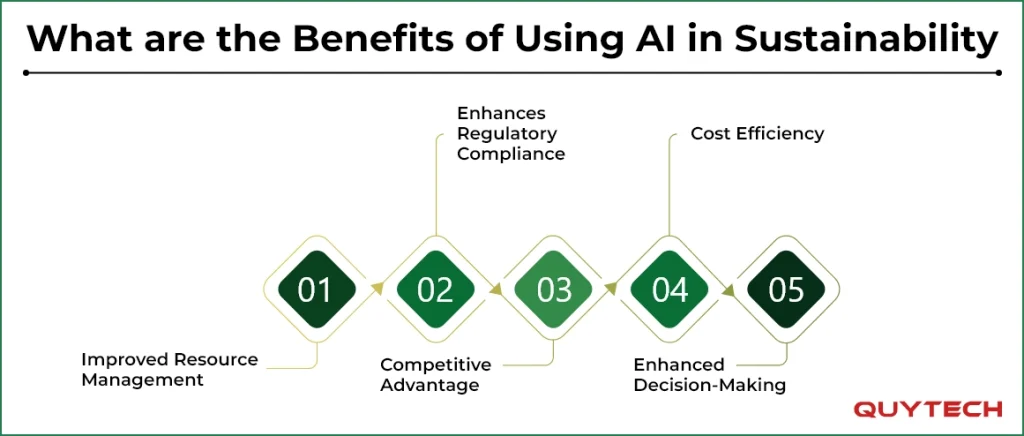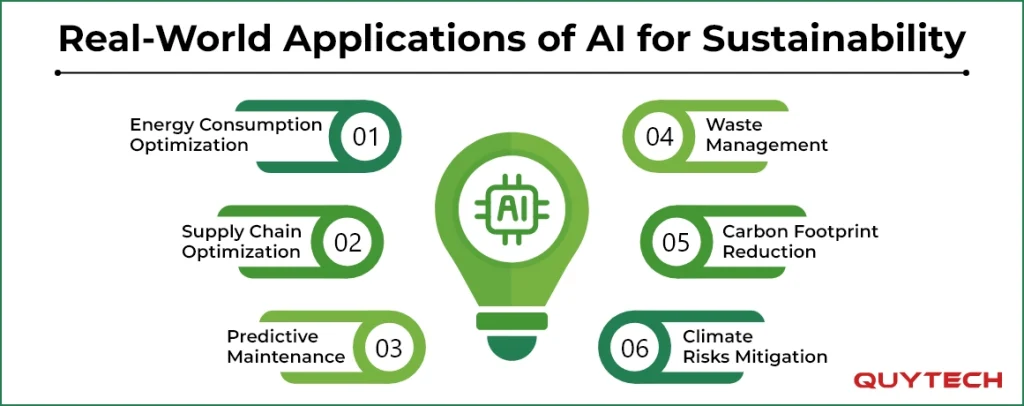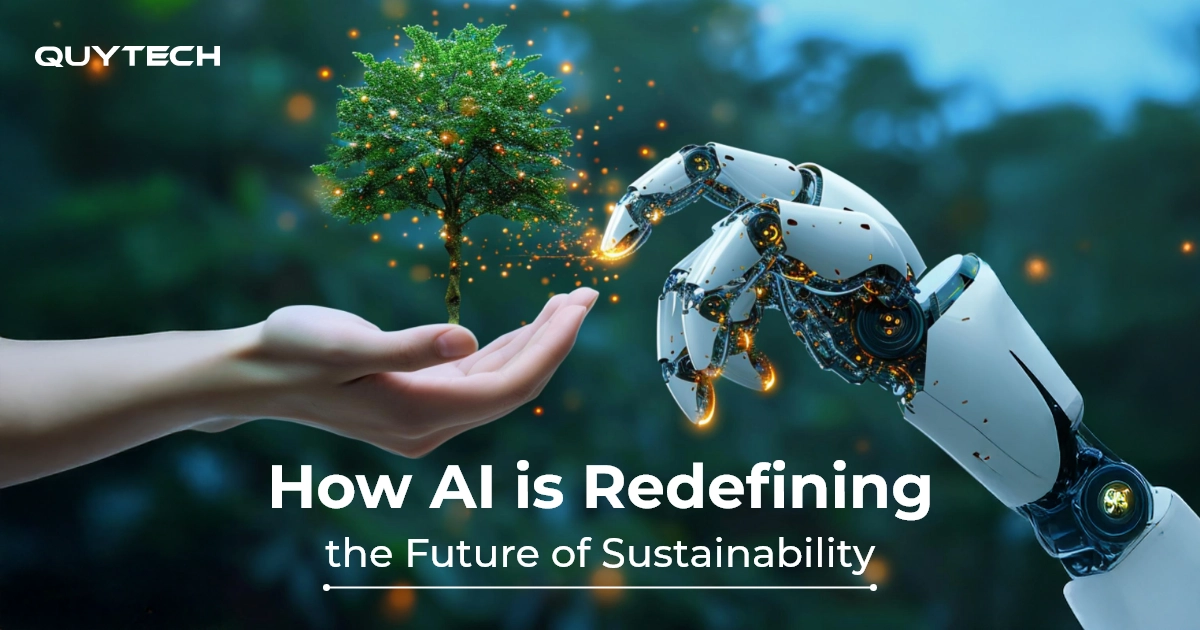Key Takeaways:
- AI in sustainability enables measurable outcomes through data-based resource management and emission reduction.
- It follows a proactive approach by analyzing operational data and offering suggestions on how organizations can implement sustainable practices.
- AI-based sustainability drives smarter operations by optimizing resources, cutting waste, and lowering costs for sustainable enterprise growth
- The future growth trends of AI for sustainability include the integration of generative AI, agentic AI, and low-energy business models.
We have entered an era where every organization is implementing AI-based technologies in its workflows to stand out from the competition. The bar is so high that merely introducing innovation is no longer sufficient. Ideas blending innovation and responsibility towards sustainable development are redefining the future.
With 94% organizations planning to adopt sustainability, environment-focused practices are setting the standards of innovation. This shows that AI in sustainability is not a trend; it’s a revolution. And organizations joining this revolution are the ones gaining a competitive edge.
How? Implementing AI-based sustainable practices benefits not just the environment but also the organization. It improves resource management methods, enhances decision-making processes, and saves costs all along the way.
If you want to learn more about AI in sustainability, this blog is for you. We have covered everything from the concept to the future trends of AI in sustainability.
Understanding The Concept of Sustainability
The concept of sustainability is quite simple. At its core, sustainable development focuses on growth and development without depleting resources or harming the environment. Sustainability incorporates a sense of responsibility for generations utilizing resources.
When looked at from an organizational point of view, implementing the concept of sustainability is not limited to environmental benefits only. Sustainable development adoption means incorporating practices that are not limited to a certain resource or way of operation. It encourages steady and adaptable growth to match the fast-changing business world.
Modern investors look for organizations that emphasize adding value to the business without draining the value from the environment. Here, the value is not limited to resources; it goes beyond that. It reflects the ability of an organization to thrive with adaptability to the changing environment. Hence, sustainability emphasizes a flexible, adaptable, and responsible idea of growth.
Enterprise Sustainability Gaps and How AI Bridges Them
Even with a sustainability plan, many enterprises struggle to close the gap between intent and execution. Be it wastage in terms of resources or overcoming blind spots, enterprise practices often fall short in some areas. Here are some of them:
Resource Wastage and Operational Inefficiencies
Inefficient Energy Consumption
Overconsumption of energy is a very common way in which organizations harm the environment. Being a basic need to run something as small as a light bulb to heavy machinery, energy consumption is something that is inevitable.
However, the consumption cycle is often fixed, and rarely fluctuates the demand. Using energy sources in times when they’re not needed causes a rise in carbon emissions.
AI in sustainability makes use of ML and predictive analytics to monitor and analyze energy requirements. Based on the results, it manages energy as needed.
Material and Inventory Waste
Another operational inefficiency adding harm to the environment is the wastage of material and inventory. This usually happens when enterprises do not follow smart demand forecasting practices. It leads to overstocking and overproduction, naturally adding more waste to the environment.
AI in sustainability analyzes historical as well as real-time resource requirements. It offers data-driven insights that assist with placing orders and maintaining optimal inventory levels.
Inefficient Logistics Practices
Inefficient logistics practices like warehousing perishable materials or using transporting services below their capacity, also add to harm to the environment. In such cases, the fuel consumed to transport fewer goods is the same as in the case of transporting to capacity. This naturally adds to carbon emissions and increased operational costs.
AI in sustainable development follows route optimization practices. These contribute to reducing inefficient trips and fuel consumption. It tracks product shelf life, dispatch procedure, etc., to optimize warehouse management.
Lack of Visibility and Data Fragmentation
Ineffective Monitoring
The lack of intelligent monitoring systems makes enterprises depend on manual and periodic monitoring processes. This impacts organizations’ capacity to perform, as these processes follow a reactive approach. Because of this rigidity, performance inefficiencies are identified only when they occur.
AI in sustainability introduces real-time monitoring systems that track operations throughout. Along with this, it helps in predicting maintenance needs to ensure smooth working.
Blind Spots in Supply Chain
When collaborating with external parties, enterprises cannot assess scope 3 emissions. This means that they may not be aware whether or not their suppliers or related parties follow sustainable practices.
This blind spot ends up making ethical source verification challenging. Since enterprises do not have control over collaborators’ operation practices, they might not be aware of whether they follow labour practices.
AI in sustainability validates ethical sourcing by tracking and analyzing supplier data. This assists enterprises in choosing a supplier that adheres to sustainability and fair labour practices.
Poor Decision-Making and Risk Management
Slow Disaster Response
Many enterprises lack the resources to gather weather and climate-related data. This results in a lack of preparedness in case of disasters, calamities, or sudden market fluctuations. Unpreparedness naturally ends up impacting the ability of the enterprise to cope with the ever-changing economic conditions.
AI-based sustainable development assists enterprises in analyzing weather patterns. This helps in enhancing preparedness against sudden changes. It allows them to proactively plan safety measures to minimize the impact of calamities.
Regulatory Non-Compliance
The environmental, social, and governance standards are very dynamic. Continuous changes in the regulations and expectations often make it hard for enterprises to track and adhere to them. Due to this, organizations fail to represent their sustainability effectiveness even after following them.
AI in sustainability helps enterprises stay up to date with the dynamic ESG regulations. It automates ESG data collection, analyzes it, and creates reports to ensure that organizations comply with regulatory expectations.
Interesting Read: AI in Crypto Trading in 2026: Risks, Real-World Use Cases, Benefits, and More
What are the Benefits of Using AI in Sustainability
Implementing AI in sustainability brings in a whole lot of benefits for not just the organization but also for the environment. It benefits organizations by improving their resource management, decision-making processes, and cost efficiency. Let’s take a deeper dive and understand the benefits of using AI in sustainability:

Improved Resource Management
AI in sustainability makes use of machine learning algorithms to grasp the resource usage patterns. It counts everything in this process, be it utilization or wastage. This helps AI in understanding the actual resource requirements and managing them accordingly. Hence, improving the resource management process.
Enhanced Regulatory Compliance
AI in sustainability ensures that organizations comply with the sustainability regulations. As the emphasis on sustainability increases, regulatory compliance has become very important. With AI for sustainable development, businesses can rest assured that they comply with the required regulations. This automatically saves organizations from getting penalized for not adhering to regulations.
Competitive Advantage
Organizations adopting AI-based sustainability practices create an image of responsibility towards the environment. And with increasing emphasis on resource conservation and responsible utilization, sustainable practices add to the credibility of an organization. This gives businesses a competitive advantage in the marketplace.
Cost Efficiency
When AI-based sustainability practices are implemented in organizations, companies can effectively plan their resource requirements. This results in not just better resource management but also saves costs that are incurred in case of wastage. Hence, organizations do not need to pay for resources they do not utilize.
Enhanced Decision-Making
Organizations generate loads of data from every activity they carry out. When AI-based sustainability practices are implemented, this data is collected, cleaned, analyzed, and used to make informed decisions. This is done with the help of machine learning algorithms and data analytics tools.
You Might Also Like: AI in Intelligent Document Processing: A Comprehensive Guide
Real-World Applications of AI for Sustainability
Now that you are familiar with the benefits of AI for sustainability, let’s help you understand its real-world applications. As you know already, AI for sustainability helps organizations save costs, manage resources, and make informed decisions. But its applications have much more to offer. Here are some core applications of AI for sustainability:

Energy Consumption Optimization
AI in sustainability assists enterprises in managing their energy consumption cycle. It makes use of IoT sensors that monitor electricity consumption across systems in real-time. Using historical and operational data, AI predicts future energy demand. This helps enterprises manage their energy consumption cycles and reduce costs.
The energy consumption optimization is applicable for corporate offices, manufacturing units, retail industries, etc.
Supply Chain Optimization
AI-based sustainability practices analyze historical as well as real-time data collected from IoT devices. This analysis helps in forecasting future demand and managing inventory. Along with this, it contributes to a smoother supply chain optimization experience for organizations.
The supply chain optimization is applicable for organizations based on logistics, e-commerce, retail, and transportation industries.
Predictive Analytics
AI in sustainability helps organizations in predicting future machinery breakdowns. This helps organizations in proactively addressing the problem instead of wasting resources because of unexpected downtime. Technologies like predictive analytics and IoT sensors support this future forecasting.
Predictive analytics is beneficial for organizations belonging to the automotive, energy, and transportation industries.
Waste Management
Sustainable development using AI identifies operations generating waste. It tracks production cycles and inventory levels to ensure that they do not contribute to waste generation. Additionally, AI in sustainability automates waste sorting and recycling, naturally adhering to sustainability requirements.
Waste management practices apply to all industries but are particularly beneficial for smart city waste management systems, manufacturing units, and the retail sector.
Carbon Footprint Reduction
AI for sustainability assists organizations in tracking the carbon footprint produced by them while carrying out different activities. Along with this, it offers insights on how companies can reduce their carbon footprint. This is mainly carried out by machine learning and IoT sensors.
Carbon footprint reduction practices apply to the corporate sector, manufacturing, transportation, and logistics industries.
Climate Risks Mitigation
Sustainable development using AI helps organizations predict climate risks at an early stage. This contributes to the proactive preparedness of organizations to face these risks. The core technologies supporting this application include predictive analytics, machine learning, etc.
Climate risk mitigation is beneficial for agriculture, government disaster management, insurance, and construction sectors.
Read More: AI in Cyber Threat Prediction and Defense: Strengthening Cybersecurity
Challenges and Best Practices for Implementing AI in Sustainability
While implementing AI in sustainability practices benefits organizations in multiple ways, the journey might not be the smoothest. Some challenges can end up slowing down the implementation process. Others may create a sense of hesitancy towards AI integration. But worry not! Here’s a section that will guide you through the challenges and the best practices for implementing AI in sustainability:
Incompatibility with Legacy Systems
A commonly faced challenge while implementing AI-based sustainability solutions is incompatibility with existing systems. This challenge arises when existing systems used in organizations are outdated.
Such organizations can either opt for customized AI-based sustainability solutions or choose API-based integration practices.
Data Availability and Quality Issues
As it’s known already, AI-based sustainability solutions rely heavily on data for operations. The challenge that impacts implementation here is that many organizations have limited data availability. Many times, the available data is of poor quality as well.
In such a situation, organizations can implement data governance frameworks to ensure the availability and quality of data.
High Costs of Implementation
Since implementing AI in sustainable development practices involves introducing sophisticated technologies, the costs of implementation rise naturally. The high costs can make the organizations hesitate and take a step back.
To tackle this situation, organizations can opt for cloud-based and pre-built systems. These do not require premise hosting and maintenance. This helps organizations save costs while implementing AI in sustainability.
Resource Exhaustion by Data Centers
While implementing AI in sustainability is aimed towards saving resources, the process of implementing and maintaining data centers itself can exhaust them. Data centers consume a lot of electricity and water resources, which not only exhaust these resources but also increase carbon emissions.
Best practices to tackle this challenge include shifting to renewable energy like solar and hydro-based energy sources. Along with this, energy optimization methods also contribute to the same.
You Might Also Like: AI in Employee Performance Analysis and Skill Development
Emerging Trends for AI in Sustainability
As the awareness towards the scarcity of environmental resources rises, the need for advanced solutions will also skyrocket. In simple words, the implementation of AI in sustainability is not just a wave of trend, but a whole evolution. The future holds many more advancements for AI in sustainability. Here are some future trends of AI in sustainable development:
Generative AI in sustainability
In the future, generative AI will be seen as a collaborative technology in sustainability. Generative AI will assist in simulating different scenarios and give suggestions to tackle the situations.
Agentic AI in Sustainable Development
AI in sustainability itself will have a massive makeover by implementing agentic AI. With this advancement, sustainability operations will be carried out automatically with autonomy. This future trend will contribute to the real-time decision-making capabilities of AI in sustainable development.
Low Energy Business Models
With environmental awareness reaching the masses, future business models will come equipped with AI-based sustainability practices. These models will be equipped with energy-efficient data centers, carbon tracking models, and much more.
From Strategy to Execution: How Quytech Delivers AI-Based Sustainability Solutions
With the increasing shift towards AI-based sustainability practices, organizations need a reliable partner to bring their vision to existence. This is where Quytech comes in! With varied industry experience of over 14 years, Quytech excels in delivering tailored AI sustainability solutions.
From building development strategies to executing them, our team keeps you in the loop, offering transparency with utmost dedication. Our strong foothold proves our ability to understand diverse organizational needs. With strong emphasis on scalability and customization, Quytech delivers solutions made for your business to grow with your business.
Conclusion
The times have changed a lot. Society has become more and more aware of sustainable development, and environmental consciousness has taken a leap. In such times, organizations should take the sign and adopt AI-based sustainability. Reflecting responsibility in carrying out operations while keeping resource availability in mind benefits organizations in many ways.
Not only does it improve resource management, but it also enhances regulatory compliance and the decision-making process. This allows organizations to contribute to sustainability while benefiting from the same. In conclusion, organizations embracing AI in sustainability practices are the ones leading with a competitive edge.
FAQs
No, modern AI-based sustainability solutions offer dashboards that interpret insights gathered from data analysis, so employees can use the tools without technical expertise as well.
Yes, small businesses can use AI for sustainability. It is very beneficial for small businesses as AI implementation can help them reduce costs and operate efficiently.
No, AI is not replacing human involvement in sustainability initiatives. Instead, it is assisting them by providing smart insights with the help of AI.
No, you do not need a technical team specifically to implement AI in sustainability. You can implement AI by either partnering with an AI solution development company or by hiring developers.


